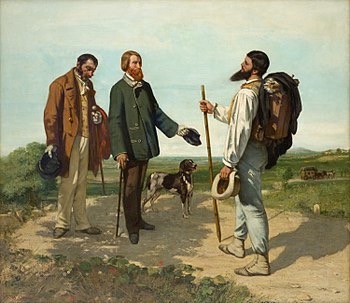ArtificialEverything

Bonjour, Monsieur Courbet, 1854. A Realist painting by Gustave Courbet
" … a small town that grew up to still be small, but somehow less of a town for it."
South Table Mountain juts up as backdrop to the small town of Golden, Colorado. Its basalt rimrock crowns unpromising grades, draws, and washes still frequented by bear, bobcat, and small deer who browse surrounded by more rattlesnakes than I like to think about. Years ago, circa WWI, the Army built a base up against one side of it, but the rattlesnakes chased them off. A minimum security prison camp now inhabits what of that camp not ceded to the snakes, and The National Renewable Energy Lab sits just next door. High tension power line towers run across the top of South Table Mountain to service the largest beer manufacturing plant in the world along Clear Creek below. Failed attempts to build roads to the top remain as overgrown scars along all sides of the prominence. People ride horses up there, and mountain bikes, and even hike, though there's more to trip over than actually see up there. It seems a genuine bit of nowhere, offering views of Downtown Denver, not anybody's idea of a sight to treasure beholding, though the locals think of it as nature just out their backdoors. ©2020 by David A. Schmaltz - all rights reserved
I sat in a Starbucks, sucking down a china cup of decaf and staring up toward the top of that small mountain, realizing that almost nothing I could see bore much resemblance to nature. The strip along South Golden Road long ago surrendered to commerce, leaving a string of mismatched one story, mostly cinder block buildings housing almost every small business imaginable: tire stores, gas stations, quick-marts, a chain drug store, even a supermarket, each eyesores in their own right. Even the beautifully-appointed Starbucks in which I sat served as just another bit of visual clutter in the neighborhood. Condos hung along the adjoining side streets, and mostly small single family homes, the type with an iconic rusting pickup wreck alongside the driveway, giving way to larger but equally inelegant homes further up the side of the butte. An endless stream of cars negotiated the series of roundabouts and the entire vista gave off an aura of the seriously unreal. Everything seemed distinctly artificial, antagonistic to nature, including the natural food store down closer to town.
Golden qualifies as a small town, but not a small town that James Whitcomb Riley would readily recognize, for its boundaries stretch ten miles and more up over the first line of foothills to the draw where The Villa stands. The town has a well-defined center with a small college tucked within a Gothic campus, a main street, though it's not actually called Main, and a fine all-season creek running through it. Unlike traditional small towns, one cannot find all essential services within a fifteen minute walk from anyone's front door. Those services sit along the snaking streets heading out from the center, a bus or car ride from the actual middle of town, so the center seems artificial, too, a focal point impossible to fully focus upon. These serve as my impressions, and not the way anyone intended this place to be. SmallThings influenced it evolution. It seems to be a small town that grew up to still be small, but somehow less of a town for it.
Small towns have hollowed out from sea to shining sea over the past generation. Wal-Marts drew traffic away from downtown mom and pops, leaving crappy consignment shops and, if tourists still frequent, cute crappe shops and bars. Cars make the space inconvenient for those in cars, and everyone's in a car. Parking's always a challenge. The old-timers look on in dismay at what remains of the small town they knew so very well back in the day. Realism looks like parody. Nature left long ago.
The media reports wide-spread alarm over the prospect of Artificial Intelligence, full implementation of which has always been (and many argue, will always be) about ten years away. The concern might spread from our experience with the kind of intelligence the artificial kind attempts to emulate. Our intelligence seems largely focused upon subduing nature. Achieving that, it turns all self-loathing and remorseful about the absence of nature. We genuinely need our pavements and our crummy little cinder block tire shops, and these, not awe-inspiring skyscrapers and elegant bridgeworks, best represent the product of our non-artificial intelligence. AI could help us become more efficient destroyers of nature and so further amplify our self-revulsion, reasons enough to be wary of it.


